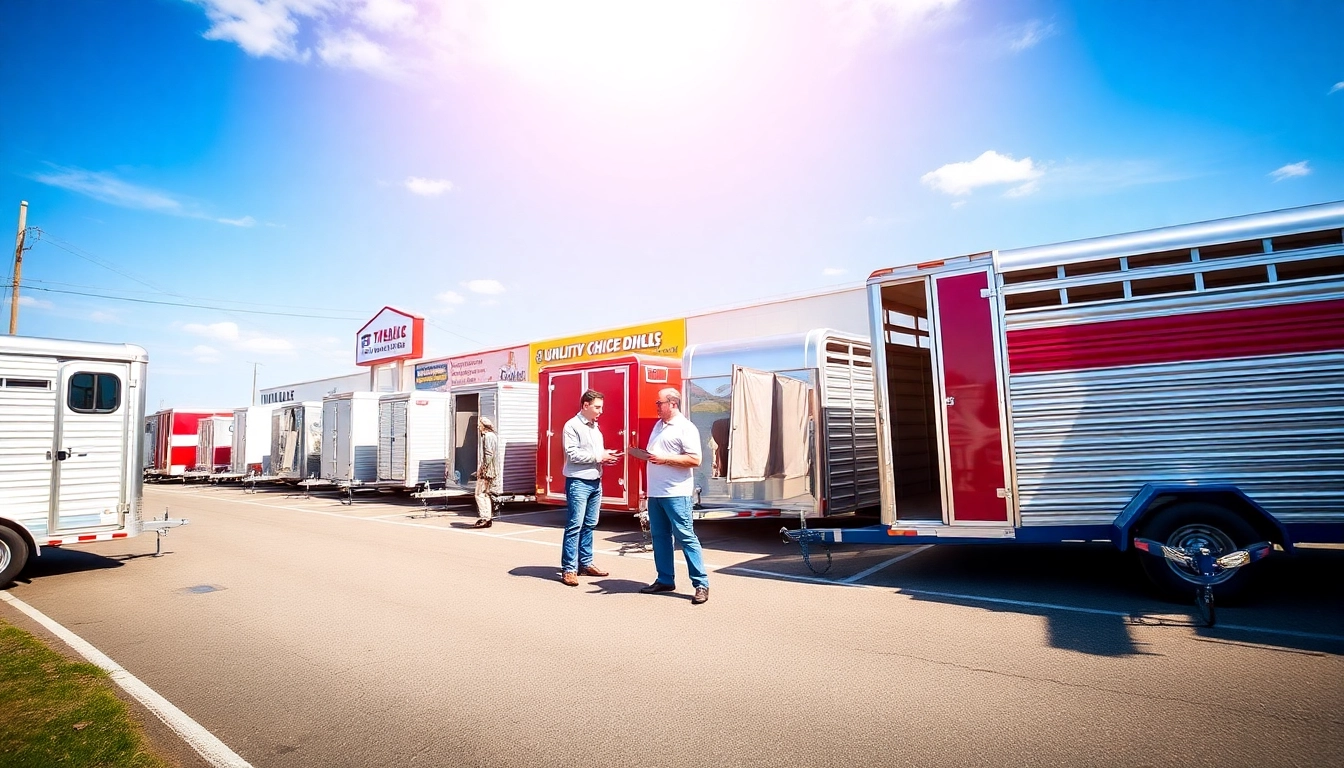Understanding Your Trailer Needs
When considering purchasing a trailer near me, it’s essential to identify your specific needs. Trailers come in various shapes and sizes, each suited for different purposes. Therefore, understanding what you need the trailer for is the first step in making an informed decision.
Types of Trailers Available
Broadly, trailers can be classified into several categories:
- Utility Trailers: These are versatile and ideal for hauling equipment, motorcycles, or furniture.
- Dump Trailers: Specifically designed for transporting loose materials, they are perfect for construction sites.
- Car Haulers: These are made for transporting vehicles, making them essential for auto dealers or individuals relocating cars.
- Travel Trailers: Perfect for vacations, these trailers often feature accommodations for sleeping and cooking.
- Livestock Trailers: Designed to transport animals, these trailers prioritize safety and comfort.
Assessing Usage and Capacity
Understanding how you will use your trailer is crucial in selecting the right one. Start by considering:
- Weight Capacity: Make sure the trailer can handle the weight of what you’ll transport.
- Frequency of Use: If you plan to use it frequently, durability becomes a key consideration.
- Distance of Transport: Long journeys may require a trailer with additional features such as better suspension and safety specifications.
Key Features to Consider
When looking for a trailer, factors such as:
- Material: Steel trailers are more durable, while aluminum offers lightweight options.
- Braking System: Electric brakes can provide better control when hauling heavy loads.
- Ramp Length: A longer ramp allows for easier loading and unloading, reducing the risk of damage.
Where to Search for Trailers Near Me
Finding the right trailer involves exploring various sources. Here are some effective ways to search for quality trailers nearby:
Online Listings and Reviews
The internet offers a plethora of resources. Websites like Crawford Truck can provide detailed inventories and customer reviews, making it easier for you to gauge the reliability and quality of each option. Engaging with online communities can also help gather insights on specific trailer models or brands.
Local Dealerships and Rental Companies
Visiting local dealerships can give you hands-on experience with the trailers. Additionally, rental companies often sell used trailers, which can offer excellent value. Comparing prices and available features at these physical locations is beneficial.
Community Forums and Recommendations
Joining forums and local community groups dedicated to trailers can provide valuable peer advice. Shared experiences and recommendations from fellow trailer users can guide you towards reputable dealers and models.
Evaluating Quality and Value
Determining the quality and value of potential trailers is a critical part of your research process. Here are several ways to do this:
New vs. Used Trailers
Purchasing a new trailer means you’ll typically get a warranty and the latest features, but a used trailer can significantly reduce costs. Make sure to inspect used trailers thoroughly for wear and potential issues.
What to Look for in a Quality Trailer
Key indicators of quality include:
- Structural Integrity: Look for rust, cracks, or any sign of damage.
- Manufacturer Reputation: Brands with strong reputations tend to offer more reliable products.
- Customer Reviews: Always check customer feedback and ratings before making a decision.
Price Comparison Strategies
When comparing prices, consider:
- Inclusions: What is included in the price? Check for added features or warranties.
- Financing Options: Understand how each dealership offers financing, as this can greatly influence the total cost.
- Seasonal Discounts: Timing your purchase right, such as off-season times can lead to significant savings.
Navigating the Purchase Process
Once you’ve identified the ideal trailer, the next steps require careful navigation of the purchasing process.
Understanding Financing Options
Financing a trailer can often involve loans from banks or credit unions, manufacturer financing, or deals through dealerships. Always compare interest rates and terms to find the best fit for your budget.
Negotiation Tips for Buyers
When negotiating price, remember to:
- Research Competitors: Knowing competitor prices can bolster your position when negotiating.
- Be Polite Yet Firm: Politeness can go a long way, but also stand your ground.
- Consider Bundling: If purchasing multiple items, you may have room to negotiate.
Legal Considerations and Regulations
Understanding any legalities in your state, such as registration requirements, can save potential headaches in the future. Ensure the trailer meets safety and environmental standards to avoid legal issues.
Maintenance and Care for Your Trailer
Proper care for your trailer will enhance its lifespan and performance. Here are some best practices:
Routine Maintenance Tips
Your trailer needs consistent care. Execute routine maintenance checks including:
- Tire Pressure: Always check tire pressure before trips.
- Brake Inspection: Regularly inspect brake functionality for added safety.
- Lubrication: Ensure moving parts are regularly lubricated to prevent wear.
Common Repairs and Troubleshooting
Being familiar with common issues can save time and money. Some problems might include:
- Electrical Issues: Ensure that all lights are functioning correctly.
- Brake Failures: Regularly inspecting and maintaining the braking system is crucial for safety.
- Frame Damage: Regular visual inspections can help spot structural issues early before they worsen.
Seasonal Storage Best Practices
In preparation for storage, ensure you:
- Clean Thoroughly: Remove dirt and debris to prevent rust and pests.
- Inspect for Damage: Check for potential issues while the trailer is still accessible for repairs.
- Cover Properly: Using a heavy-duty cover can protect the trailer from the elements.



